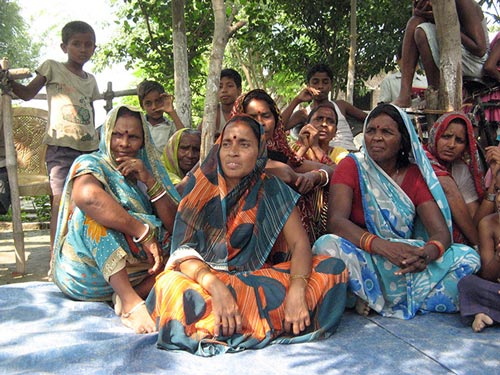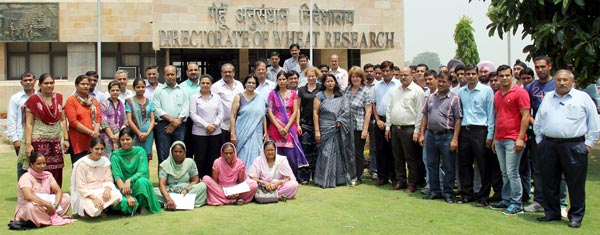 In June 2013, ML Jat (Global Conservation Agriculture Program) and research teams in Bihar and Haryana, India, welcomed CIMMYT gender specialist Tina Beuchelt and gender consultant Cathy Farnworth to discuss integration of gender perspectives into their daily research routine. The visit was triggered by the request from the CRP on Climate Change, Agriculture and Food Security (CCAFS) to enhance women’s access to and use of agricultural and climate-related services and information (IDO5).
In June 2013, ML Jat (Global Conservation Agriculture Program) and research teams in Bihar and Haryana, India, welcomed CIMMYT gender specialist Tina Beuchelt and gender consultant Cathy Farnworth to discuss integration of gender perspectives into their daily research routine. The visit was triggered by the request from the CRP on Climate Change, Agriculture and Food Security (CCAFS) to enhance women’s access to and use of agricultural and climate-related services and information (IDO5).
The visit began with discussions held with individual researchers on how to include a gender perspective in their work plans and field experiments, demonstration plots, out-scaling efforts, and surveys. The team visited farmers participating in CIMMYT/CCAFS projects in Bihar and Haryana, where lively small group discussions helped the visitors to gain a deeper understanding of the situation of women and men, their roles and responsibilities, and gender-related constraints existing in their small-scale farming systems. The team met with smallholder and better-off farmers, as well as landless workers and female-headed households to obtain a representative picture of those involved in agriculture in CIMMYT/CCAFS target areas. Men and women were interviewed separately, and CIMMYT staff helped to explain the production systems and the basket of climate-smart farming options currently available, and shared their thoughts on how to respond to specific gender challenges.
Given the varying agro-ecological environments and socioeconomic characteristics of farmers in each state, it was agreed that in order to address IDO5 successfully, new partners, new allies, and new ideas are needed. While the discussions proceeded well, one of the female participants made a timely and heart-felt warning: “You ask us to take risks, but where will you be if we fail?”
The trip culminated with a workshop on “Pathways of gender-equity led climate-smart farming: learning from stakeholders” organized jointly by the Directorate of Wheat Research (DWR), the Indian Council of Agricultural Research (ICAR), and CIMMYT/CCAFS in Haryana on 7 June 2013. A wonderful mix of male and female farmers; farmer organizations; researchers from ICAR, Haryana Agricultural University, and CGIAR; extension and developmental organizations, including the State Department of Agriculture, NGOs; private sector organizations; and politicians – about 65 participants in total – joined the workshop and contributed with great enthusiasm to discussions on advantages and disadvantages of different climate-smart technologies for women, more effective types of institutional support required to support women etc. Participants then formed small groups to discuss concrete ideas for action to support women in agriculture, which was followed by presentations and discussions in a plenary session chaired by DRW director Indu Sharma.
The workshop was concluded with dinner wherein Suresh Gahalawat, Deputy Director for Agriculture in Karnal at the Government of Haryana, who had showed great enthusiasm regarding the topic during the workshop, announced that: “Gender will become part of the agricultural policies of Haryana”. “To start with, we will include the gender component in all schemes operated in the district,” he added, confirming the importance and success of the workshop.
The Indian research team is strongly committed to integrating gender into their research activities
 .
.
 Capacity development
Capacity development 
